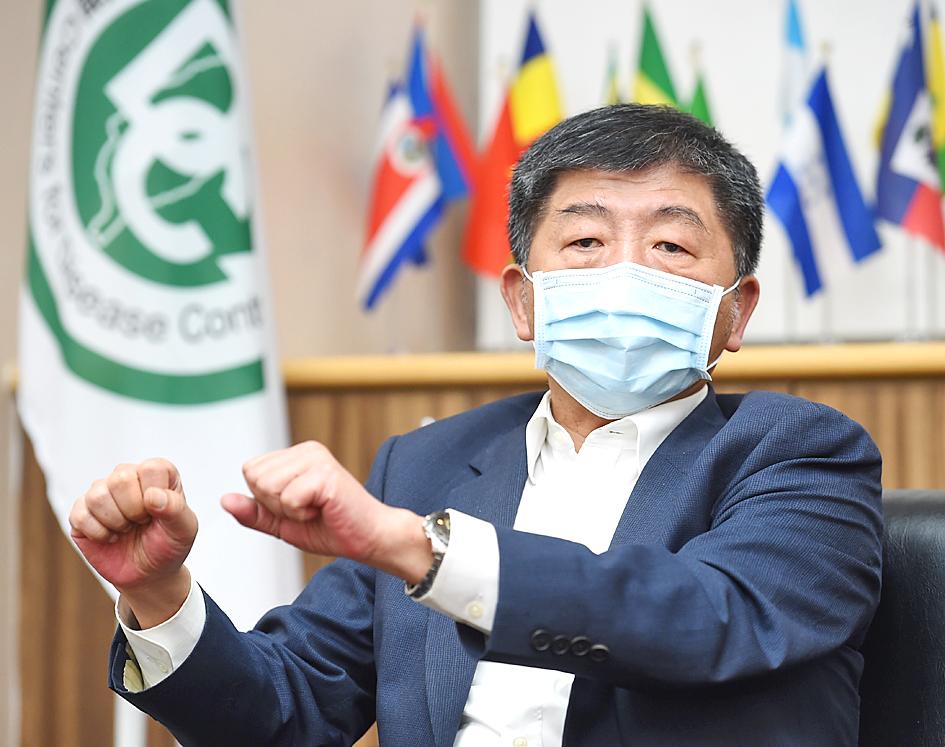The COVID-19 pandemic has shown that the nation’s medical system must be bolstered to shoulder disease prevention duties ranging from border controls to aiding local communities, Minister of Health and Welfare Chen Shih-chung (陳時中) said.
Chen, who heads the Central Epidemic Command Center, made the remarks in an interview with the Liberty Times (sister newspaper of the Taipei Times) on Friday.
Disease prevention efforts should not have to erode the provision of medical resources to the public, Chen said.

Photo: Liu Hsin-de, Taipei Times
A majority of Taiwan’s medical industry is in private hands and benign competition keeps the industry at peak efficiency, he said.
“However, being overly efficient might become a problem during pandemics, as the extra work — piled on an already heavy workload — lowers the original capability the industry could have offered,” Chen said.
Giving an example, Chen said the US medical system is strong and efficient, but as can be seen during the pandemic, most of it has closed down, collapsing under the weight of epidemic prevention, an influx of COVID-19 patients and other severe illnesses.
Likewise, Taiwan’s medical system is wound too tight and its focus on peak efficiency would mean that when the time comes, its peak performance would be insufficient, Chen said.
One method of resolving this issue is to boost government involvement, Chen said, adding: “We must leave room to do more, when it is necessary.”
Regarding the improvement of disease prevention institutions, Hospital and Social Welfare Organizations Administration Commission Director Wang Pi-Sheng (王必勝) said that besides sufficient funding and staff, public hospitals are in urgent need of systemic reforms.
Public hospitals are comprised of ministry-operated hospitals, military hospitals, veterans’ hospitals, university-affiliated hospitals, and county or city hospitals, but they cannot collaborate, as they operate under different hierarchies, he said.
If these could be integrated or grouped under an independent bureau-level organization, their overall efficiency would increase, Wang said.
Turning to the issue of overseas Taiwanese visiting Taiwan to use the nation’s medical resources, while a majority of COVID-19 cases having been imported from abroad, Chen said that most coronavirus patients are being treated using state funding and are not related to the National Health Insurance (NHI) program.
However, the pandemic has highlighted a problem in the NHI system, which is insufficient funding, he said.
Some have called for raising NHI premiums, but they must realize that there would be a certain amount of wastage, as the NHI uses a third-party payment system, Chen said.
For some, the waste is intentional, but for others, it is an institutional problem, he said, adding that if the premiums are raised too much, it would hurt those who have done nothing wrong.
Whether the system should be changed and what changes need to be made should be discussed, he added.
Additional reporting by Lin Hui-chin

Taiwan has received more than US$70 million in royalties as of the end of last year from developing the F-16V jet as countries worldwide purchase or upgrade to this popular model, government and military officials said on Saturday. Taiwan funded the development of the F-16V jet and ended up the sole investor as other countries withdrew from the program. Now the F-16V is increasingly popular and countries must pay Taiwan a percentage in royalties when they purchase new F-16V aircraft or upgrade older F-16 models. The next five years are expected to be the peak for these royalties, with Taiwan potentially earning

STAY IN YOUR LANE: As the US and Israel attack Iran, the ministry has warned China not to overstep by including Taiwanese citizens in its evacuation orders The Ministry of Foreign Affairs (MOFA) yesterday rebuked a statement by China’s embassy in Israel that it would evacuate Taiwanese holders of Chinese travel documents from Israel amid the latter’s escalating conflict with Iran. Tensions have risen across the Middle East in the wake of US and Israeli airstrikes on Iran beginning Saturday. China subsequently issued an evacuation notice for its citizens. In a news release, the Chinese embassy in Israel said holders of “Taiwan compatriot permits (台胞證)” issued to Taiwanese nationals by Chinese authorities for travel to China — could register for evacuation to Egypt. In Taipei, the ministry yesterday said Taiwan

Taiwan is awaiting official notification from the US regarding the status of the Agreement on Reciprocal Trade (ART) after the US Supreme Court ruled US President Donald Trump's global tariffs unconstitutional. Speaking to reporters before a legislative hearing today, Premier Cho Jung-tai (卓榮泰) said that Taiwan's negotiation team remains focused on ensuring that the bilateral trade deal remains intact despite the legal challenge to Trump's tariff policy. "The US has pledged to notify its trade partners once the subsequent administrative and legal processes are finalized, and that certainly includes Taiwan," Cho said when asked about opposition parties’ doubts that the ART was

If China chose to invade Taiwan tomorrow, it would only have to sever three undersea fiber-optic cable clusters to cause a data blackout, Jason Hsu (許毓仁), a senior fellow at the Hudson Institute and former Chinese Nationalist Party (KMT) legislator, told a US security panel yesterday. In a Taiwan contingency, cable disruption would be one of the earliest preinvasion actions and the signal that escalation had begun, he said, adding that Taiwan’s current cable repair capabilities are insufficient. The US-China Economic and Security Review Commission (USCC) yesterday held a hearing on US-China Competition Under the Sea, with Hsu speaking on